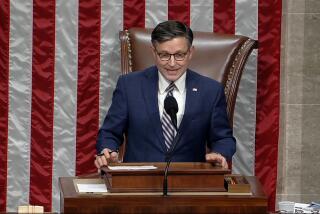State’s Troubles Catch Dukakis at Worst Time
- Share via
BOSTON — For more than a year, Massachusetts’ Michael S. Dukakis has enjoyed the benefits of being a governor running for President: the tremendous fund-raising advantage, the image of executive experience, the ability to use successful state policies to frame a national message. It seemed too good to be true, and it was.
For the past week--as he struggled with a state budget gap that was closed only Sunday--Dukakis and his aides have been trapped by a legacy of problems, built up over the six years of his tenure, which caught up with him at the most inconvenient of times.
At a press conference here Sunday, Dukakis insisted that he had enjoyed spending the last three days crunching budget numbers almost full time rather than attending to his presidential campaign.
“I find this revives and re-energizes me,” he said. “It’s a good break from the campaign and anchors me in reality.”
Campaign aides were not so happy. The budget problems have exposed Dukakis to extensive bad publicity--Republicans, for example, have made much of his decision earlier this month to sign a new cigarette tax to close part of the budget gap. And the problems at home have restricted Dukakis’ ability to campaign actively in the last week before the Democratic National Convention, which formally convenes in Atlanta today.
Talk of Southern Tour
Earlier in the week, aides had talked of sending Dukakis on a pre-convention tour of the South with his running mate, Sen. Lloyd Bentsen of Texas, a move that would have maximized the publicity Dukakis could have derived from his vice presidential choice and kept the spotlight focused on himself rather than his rival, the Rev. Jesse Jackson.
But as the Legislature delayed and balked on successive budget proposals, any plans for such a trip had to be shelved. Dukakis remained pinned down in Boston.
Dukakis’ news conference, his first public appearance in three days, ostensibly was called so the governor could sign and explain the two state budget packages that were hammered out in an all-night legislative session Saturday.
His critics accuse Dukakis of juggling his numbers and one Republican legislator called the budget a “godsend” for the GOP’s efforts to label Dukakis a “tax-and-spend Democrat” this fall. But Dukakis attempted to make the best of his unexpected budget woes.
Tells Success for Both Years
Standing in shirt sleeves and pointing to charts on a tripod, he said he had closed a revenue shortfall of $446 million for fiscal year 1988, which ended June 30, and at the same time had succeeded in producing a balanced budget for fiscal 1989. The 1988 and 1989 budget problems have the same root cause, an overestimation of revenues. To eliminate the 1988 shortfall, Dukakis earlier this spring directed his agency chiefs to rescind spending that had been planned for the year. He also devised a plan to transfer money among state funds, which required legislative approval that he finally won Saturday night.
For 1989, Dukakis said he would use about $200 million in line-item vetoes and deferrals of spending and about $190 million in new taxes, fees and closing of tax loopholes in order to erase the deficit in the budget that the state Legislature approved last week.
Under his accounting, both years will now produce a surplus instead of deficits. “We fashioned creative solutions,” he said.
Tax on Cigarettes
The new taxes include the $40-million sales tax on cigarettes that Dukakis signed last month, a measure linking the state and federal tax codes to raise $75 million, a $65-million corporate tax and fee package, and additional fees totaling about $10 million. Dukakis called the increases “modest, coming after $700 million in tax cuts in the last five years.”
Dukakis ruled out a broad-based state tax “barring catastrophe,” and said his budget next year did not cut government services. Funding for AIDS research, prisons and homelessness were increased slightly.
“Frankly, I don’t see much pain here,” he said.
Dukakis is only the latest in a long series of state chief executives who have run into problems trying to go from the Statehouse to the White House. In 1976, for example, former Georgia Gov. Jimmy Carter, campaigning at an Iowa pig farm, inspected a litter of piglets and said it reminded him of the Georgia Legislature. California’s Edmund G. Brown Jr. had to cut short campaign swings for fear that his Republican lieutenant governor would take control of the state machinery in his absence.
Two Forgo White House Bids
In the current election cycle, Arkansas Gov. Bill Clinton and New York Gov. Mario M. Cuomo examined possible presidential bids and then turned them down, in part because of fears that they would not be able to mesh the demands of a campaign with the duties of public office.
“If I leave Albany for more than a week, they steal my desk,” Cuomo said last fall of his state’s Legislature. By contrast, he said, Dukakis simply could “leave a laundry list” for the heavily Democratic Massachusetts Legislature and trust that it would be enacted.
It has not worked out that way. In part, the problem was identified years ago by one of Massachusetts’ most prominent politicians: former House Speaker Thomas P. (Tip) O’Neill Jr. “All politics is local,” O’Neill used to remind his colleagues, and that rule is particularly true in places like Boston, with its long tradition of strong local political infighting.
In part too, however, the problem stems from Dukakis’ own history of poor relations with his Legislature, one which continues to raise questions about how well he would be able to handle relations with Congress were he to win in the fall.
State Senator’s Role
Both problems can be illustrated by Dukakis’ relationship over the past two months with state Senate President William Bulger, the archetype of the Boston Irish pol with whom he has had problems throughout his governorship.
Dukakis has taken Bulger on the campaign trail with him, praising him abundantly at several campaign stops. The praise, however, did not stop Bulger, who represents mostly white South Boston, from inserting into the state budget a provision to allow white children to transfer out of the city’s troubled school system to the suburbs. Liberal critics said the proposal might destroy the city’s long-fought-over school desegregation plan, and Dukakis vetoed it Sunday, placating Bulger by saying that he would accept a different plan to be worked out later this year.
More to Read
Get the L.A. Times Politics newsletter
Deeply reported insights into legislation, politics and policy from Sacramento, Washington and beyond. In your inbox twice per week.
You may occasionally receive promotional content from the Los Angeles Times.












